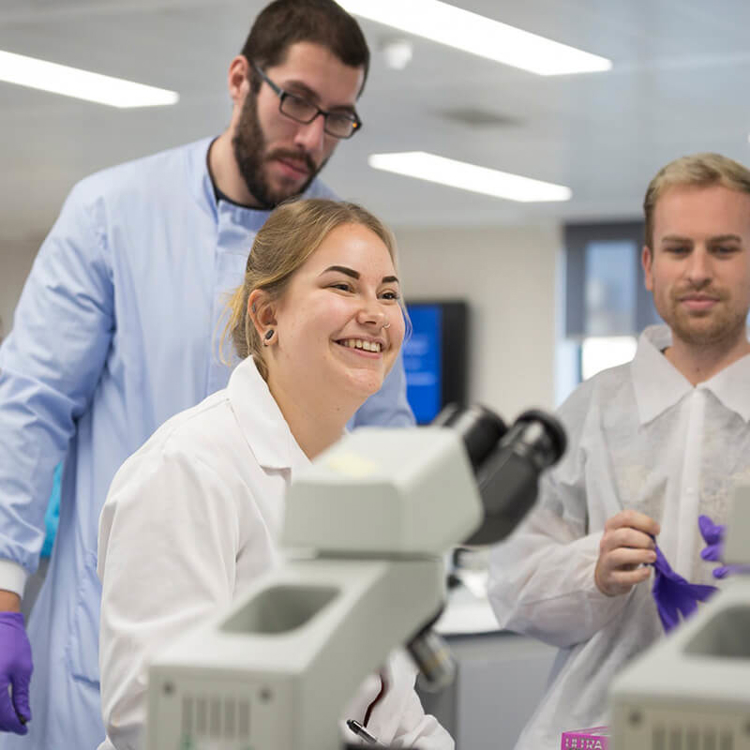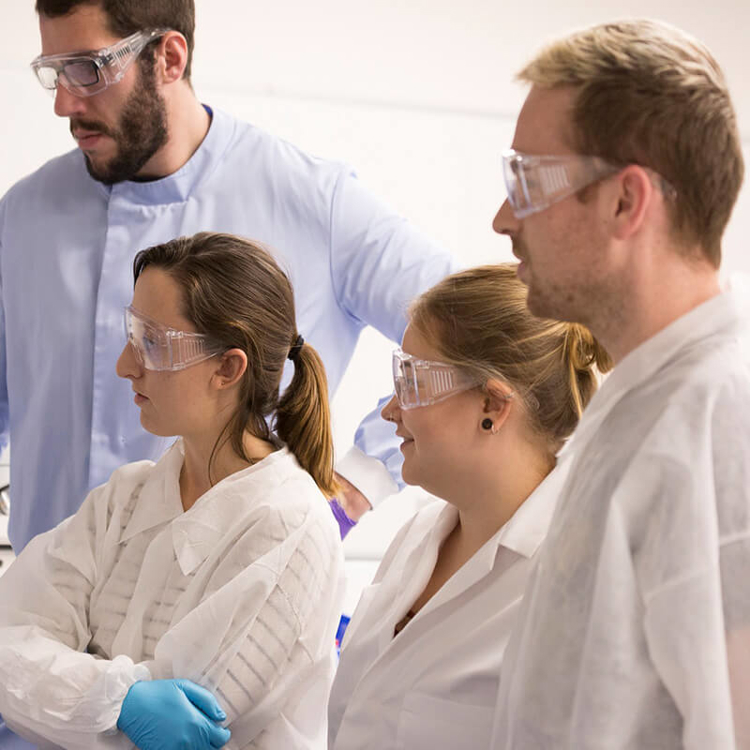/ Undergraduate /
Start date:
September 2025
Entry tariff:
112–128 UCAS points (or equivalent)
Foundation Year: 64–80 UCAS points (or equivalent)
UCAS Code:
B940
B944 (if choosing foundation year)
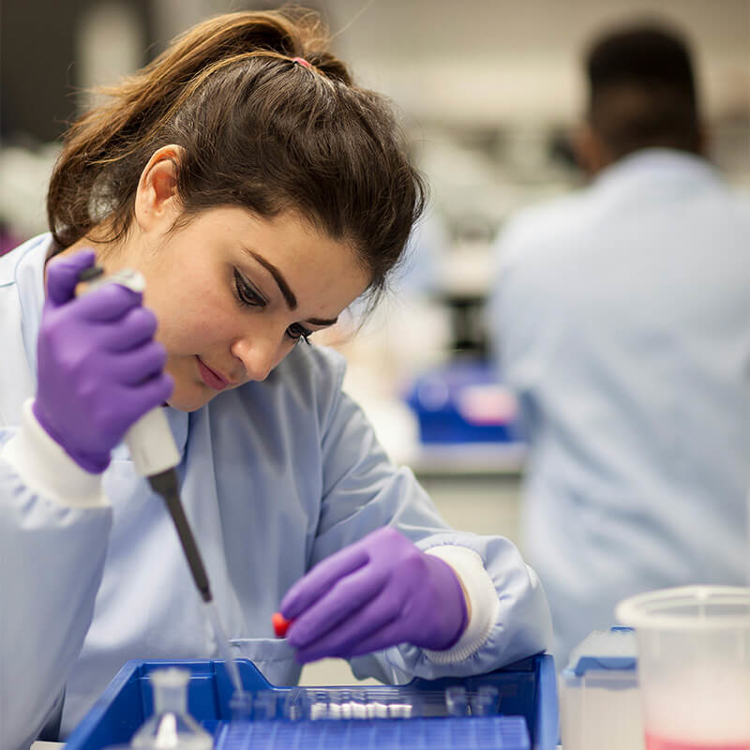
On-Campus Open Day
Saturday 12 July 2025
Improving human health has never been a bigger global challenge. Get the specialist, practical skills you need to play a part in advancing the treatment and prevention of disease.
Did you know?
A biomedical science degree aligned to contemporary industry practices - modules reflect current issues in biomedicine and biotechnology.
Accredited by the Institute of Biomedical Science, graduates will meet the academic qualification requirement to become a registered Biomedical Scientist working in NHS Pathology laboratories.

Top 3 modern university in London
(Complete University Guide 2025)

Ranked in the top 15% in the world
Times Higher Education Young University Rankings 2024

Ranked 3rd in the UK for Academic Support
National Student Survey 2024 for Biosciences

Foundation Year
This course can also be studied with a foundation year (September entry only).
Modules
This course offers all students the option of a one-year paid work placement, to boost your employability even further. If you choose this route, you will take the placement following year two of your course, and then return to complete your degree.
Why take a placement?
A placement year is the perfect opportunity to gain valuable work experience, to build on the career skills we will teach you on this degree. The connections you make on the placement will improve your career prospects further, and equip you with the skills you need to secure graduate-level employment.
How we support you
The University's Placement and Work Experience Team are experts at helping you to secure a placement. They will work closely with you from the start, helping you research potential employers, discover placement opportunities, create and pitch your CV, and will coach you to perform well in interviews. We aren't able to guarantee a placement, but our sector-leading advisors will give you the best possible chance of securing one.
Find out more about how we'll support you
We understand that your plans might change once you start your programme. If you decide not to do a placement, you will have the option of completing the three year version of your programme.
Whatever your choice, you will have access to many opportunities for work experience through our Placement and Work Experience Team, and access to face-to-face and 24/7 online careers support.
This course offers a foundation year, which takes place at the beginning of your studies. Studying a foundation year will give you academic and practical experience, and a strong introduction to your subject, ensuring you succeed on your undergraduate degree.
30 credits
You will develop your core academic and integrated English language skills of speaking, listening, reading and writing. You will become familiar with key academic skills and concepts, such as referencing methods and awareness of academic integrity and tone. You will apply these skills and knowledge to both broad topics and also your chosen subject pathway.
Teaching and learning
You will be required to actively engage in on-campus learning for up to 10 hours a week.
You will be taught through a full range of teaching and learning methods, which include lectures, seminars, workshops, discussion groups, group directed tasks and presentations. This will enable you to learn from your peers and tutors in both structured and information settings.
You will be encouraged to think creatively about your approach to learning and discussions with your peers. You will also have access to recordings, resources, links and signposting through Moodle to enrich your learning.
Assessment
You will be assessed through group and individual presentations, comparative and reflective essays, multiple choice exams, coursework and reports, oral exams, portfolios, case studies and blogs.
30 credits
You will develop your research, numeracy and information technology skills. You will investigate the difference between primary and secondary research, conduct your own research project and demonstrate your findings through data analysis. You will also develop your awareness of equality, diversion and inclusion in the UK, through a real-world issue; discrimination in the workplace.
Teaching and learning
You will be required to actively engage in on-campus learning for up to 10 hours a week.
You will be taught through a full range of teaching and learning methods, which include lectures, seminars, workshops, discussion groups, group directed tasks and presentations. This will enable you to learn from your peers and tutors in both structured and information settings.
You will be encouraged to think creatively about your approach to learning and discussions with your peers. You will also have access to recordings, resources, links and signposting through Moodle to enrich your learning.
Assessment
You will be assessed through group and individual presentations, comparative and reflective essays, multiple choice exams, coursework and reports, oral exams, portfolios, case studies and blogs.
30 credits
The module provides you with an essential introduction to the core principles and concepts that underpin biological sciences and offers you a multidisciplinary approach to understanding life at the molecular, cellular, and organismal levels.
You will examine how genetic, environmental, and socio-economic factors affect biological processes, with a focus on how certain groups may experience differing health risks or benefits. For example, you will study how genetic disorders, and metabolic diseases manifest differently across ethnic groups, and how access to healthcare or diagnostic tools can vary globally.
Throughout the module, case studies and discussions will emphasize the importance of inclusive practices in scientific research and healthcare, ensuring that biological studies and their applications reflect and serve the needs of all communities. Additionally, career-focused workshops will address the importance of diversity in STEM fields, providing you with a broader understanding of career opportunities and the role inclusivity plays in advancing biological sciences.
The module addresses sustainability through its focus on human health, environmental factors influencing biology, and the role of biological sciences in solving global challenges.
Topics such as metabolic processes, water balance, and body fluid composition can help you understand the body’s need for sustainable nutrition and hydration. Furthermore, by discussing diagnostics such as blood glucose testing and the effects of pollutants or chemicals (like endocrine disruptors in cosmetics), the course encourages you to think critically about sustainable practices in healthcare and their impact on individual and environmental health.
You will learn about genetic disorders and viral infections that affect populations worldwide, gaining insight into health issues across different regions. Case studies on health disparities and global diseases will be integrated into lessons to ensure you are aware of the worldwide scope of biological and medical science.
Teaching and learning
Through a combination of lectures, interactive seminars, laboratory sessions, and group projects, you will explore topics such as cellular structure and function, molecular biology, biochemistry, physiology, and homeostasis.
The module also gives you the opportunity to develop practical laboratory skills, critical thinking, and quantitative analysis, ensuring you are well-prepared for advanced study, research and undergraduate level.
The teaching delivery for each module consists of one, one-three-hour lecture and one, two-hour seminar per week. Lectures will cover core indicative content, while seminars will consist of research workshops, small group learning on relevant case studies and practical lab sessions.
You will also have an additional 30 minutes of online support each week, which will consist of formal preparation/review of lab sessions, or exam preparation (e.g. quizzes).
Assessment
This module will be assessed using an open book in-class test and a lab report and reflection.
50% - open book in-class test, consisting of 30 multiple choice questions.
50% - lab report and reflection, the report will include detailed analysis (quantitative and qualitative) of a chosen practical lab session, with an evaluative reflection of the practical limitations and implications of the undertaken research/experimentation.
30 credits
This module provides you with a comprehensive introduction to the principles of human health, the mechanisms underlying diseases, and the tools used to study them.
This interdisciplinary module integrates knowledge of physiology, pathophysiology, epidemiology, and biostatistics to equip you with a well-rounded understanding of the factors that influence human health and the burden of disease.
The module explores health disparities and inequities across global populations, emphasising how factors like ethnicity, socio-economic status, gender, and geography influence health outcomes. You will analyse worldwide health statistics, such as life expectancy, infant mortality rates, and access to healthcare, to understand systemic inequalities. Case studies will focus on specific healthcare challenges, such as the unequal burden of non-communicable diseases (NCDs) in low- and middle-income countries, or disparities in vaccination rates across regions.
Sustainability is embedded by exploring the role of health systems in promoting long-term wellbeing and reducing environmental impacts. Topics such as the rise of sustainable healthcare practices, including reducing medical waste and using renewable resources in healthcare delivery, will be discussed. You will also reflect on how public health policies can contribute to sustainable development goals by promoting preventative care and addressing environmental factors that affect human health.
Global engagement is incorporated through an examination of how diseases and health interventions are influenced by global factors such as pandemics, climate change, and globalisation.
You will analyse global health policies, including the role of organisations like the WHO in managing health crises, and investigate variations in disease prevalence and healthcare access across different countries. Comparative research tasks will help you appreciate the global nature of health challenges and solutions, such as those experienced during the COVID pandemic.
Teaching and learning
Through a blend of lectures, practical sessions, and research-focused activities, you will explore the key physiological systems that maintain homeostasis, the causes and mechanisms of diseases, and the role of public health interventions.
The module will also introduce you to fundamental research methodologies and statistical analysis, emphasizing the importance of data-driven decision-making in health sciences.
The teaching delivery for each module consists of one, one-three-hour lecture and one, two-hour seminar per week. Lectures will cover core indicative content, while seminars will consist of research workshops, small group learning on relevant case studies and practical lab sessions.
You will also have an additional 30 minutes of online support each week, which will consist of formal preparation/review of lab sessions, or exam preparation (e.g. quizzes).
Assessment
This module will be assessed using an infographic and a data analysis report.
50% - infographic, you will design an engaging and evidence-based infographic that communicates a key public health message to a target audience.
50% - data analysis report, you will be required to complete a structured data analysis report based on the analysis of a provided dataset related to a public health issue.
These modules are those we currently offer and may be subject to change.
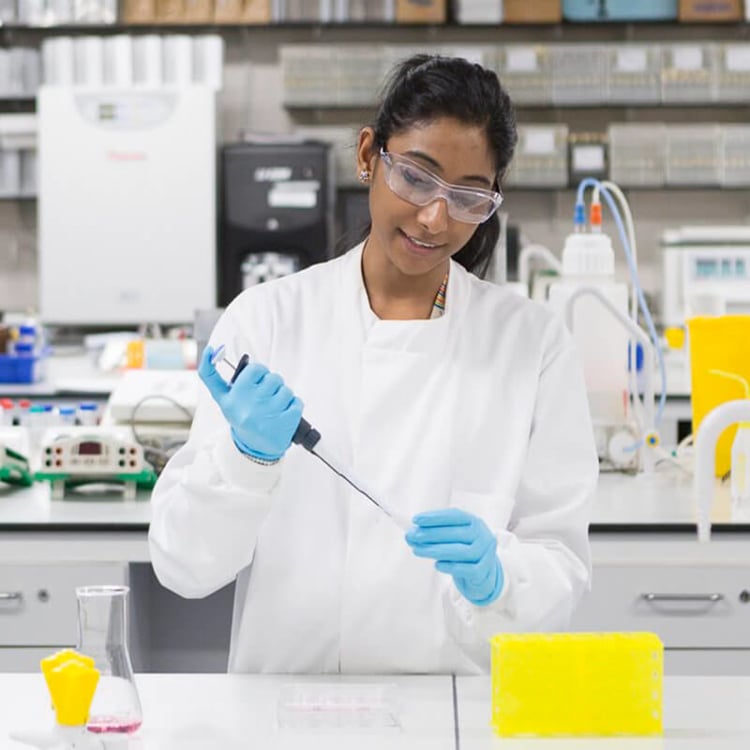
Skills
Make a difference to human lives with a degree in biomedical science.
Accredited by the Institute of Biomedical Science, this course gives you the knowledge and skills to carve out a sustainable career in the health sector.
You’ll gain a strong foundation in the science behind the human body, disease, treatment and prevention by studying:
- Cell biology
- Molecular biology
- Pharmacology: the branch of medicine concerned with the use and effect of drugs
- Immunology: the study of all aspects of the immune system.
Along with practical laboratory skills (analytical and qualitative), you’ll develop the attributes you need to succeed in the workplace, including:
- Written and spoken communication
- Problem-solving
- Teamwork
- Attention to detail.
You’ll also gain an understanding of the ethics and best practice involved in working with patients. Your employability is our priority from day one. An optional paid work placement gives you the opportunity to gain professional experience between Years 2 and 3.
This course is accredited by the Institute of Biomedical Science and offers a strong scientific foundation in the biological aspects of health and disease, ready for building a career in the health sciences. When you graduate, you’ll have the chance to pursue State Registration as a Biomedical Scientist by the Health and Care Professions Council. This involves completing a portfolio training year in an NHS pathology lab, more information can be found here.
Learning
Experience a dynamic, contemporary curriculum in state-of-the-art facilities.
Working in both small groups and individually, you’ll enjoy a mix of lectures and practicals as you work through progressive modules, including:
- Human Epidemiology and Pathophysiology: delving into how diseases develop, who is affected and why.
- Advances in Molecular Biology and Biotechnology: addressing how emerging discoveries in molecular biology are applied to clinical benefit and exploring the ethical implications.
- The Brain in Health and Disease: uncovering cutting-edge brain imaging and plasticity theories.
In Year 3, you’ll have the chance to shape your own studies by conducting research on a self-selected topic. This enables you to explore and develop current knowledge in a chosen area of biomedical science before you graduate.
Throughout the course, you’ll be supported by a dedicated and passionate team of lecturers and sector professionals.
- Laboratories equipped for DNA analysis, electrophysiology, microscopy, and more
- High-spec computer suites, supported by a team of expert laboratory and IT technicians.
Through our collaborations with some of London's world-class medical institutions, you’ll also have the chance to participate in exclusive hospital visits and projects, and gain access to specialist libraries.
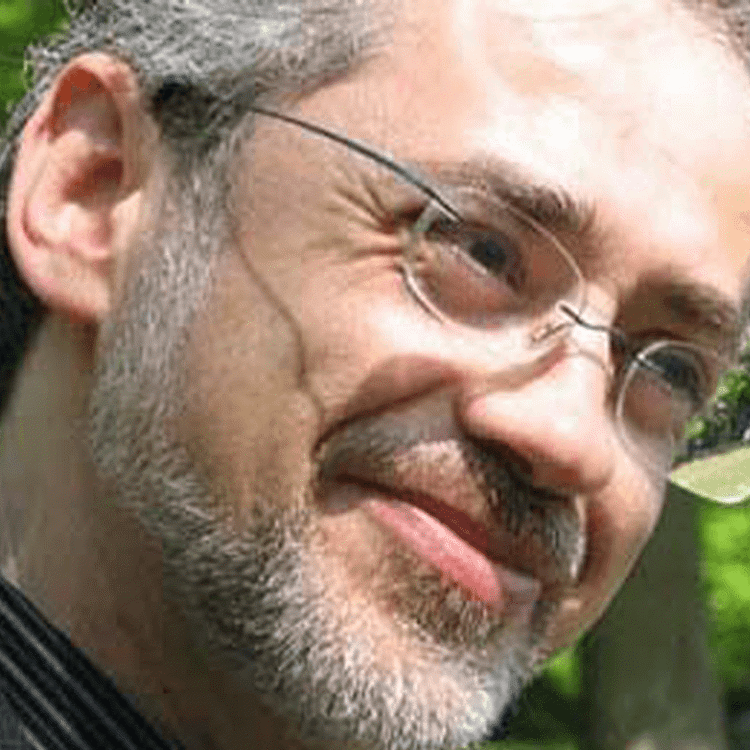
Dr Laurent Lacroix
Senior Lecturer and Programme Convener
I am Laurent; I am the Programme Convener of the BSc (Hons) Biomedical Science accredited by the Institute of Biomedical Science and I've been at Roehampton since 2012. My main speciality is neuroscience and not surprisingly I am most passionate about teaching the module,The Brain in Health and Disease which looks at the extraordinary mechanisms that make our body work. I really enjoy the discussions with students about the advances in our understanding of how the brain and our body function using real-life case studies. Working at Roehampton I particularly appreciate the fabulous campus, close to Richmond Park and close to central London, and enjoy being part of a team that is very close to students and uses its scientific expertise to illustrates teaching through their research progress.

Dr Robert Busch
Senior Lecturer
Hello, I am Robert. As a senior lecturer, I teach all years of the Biomedical Science programme. As the smallest independently-living units in our body, the vital processes that sustain cells and their mutual cooperation are fundamental to how we survive, adapt, and suffer illnesses, so this subjects is a great introduction to living systems. My research is about key mechanisms by which immune cells communicate about infectious agents to mount immune defences, and about how the same mechanisms go haywire in immune-related illnesses. I have worked in the United States and Germany and started at Roehampton in 2013. I love Roehampton's human scale, its commitment to research excellence and inclusive teaching, and its friendly staff. The sunsets over Richmond Park, seen from the rear windows of Parkstead House at Whitelands, are a lovely bonus!
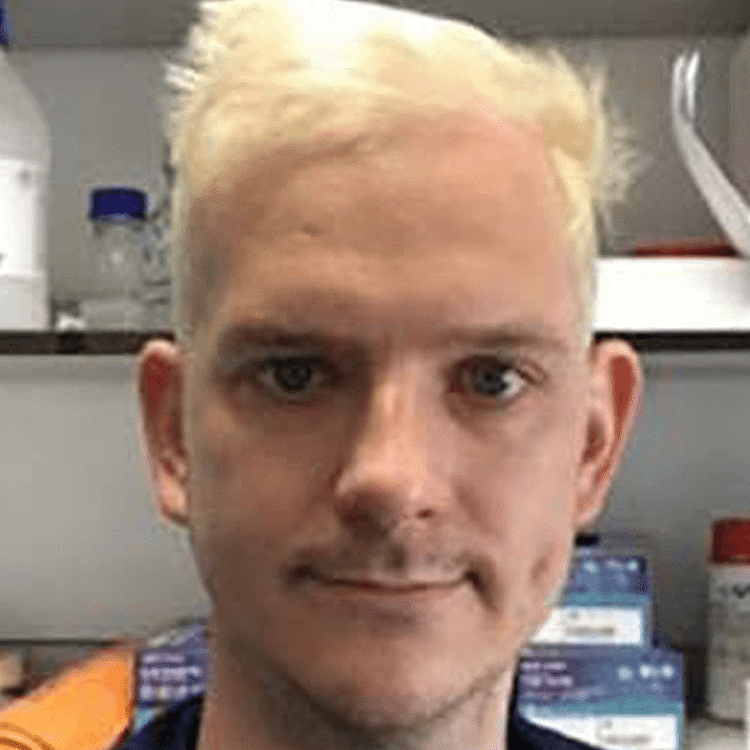
Dr Peter Wright
Lecturer
I'm Peter, I am a lecturer and I convene the Human Epidemiology and Pathophysiology module. Disease processes do not occur in isolation and are the result of multiple physical and societal pressures on the individual. As a researcher, I study the mechanisms that cells use to make sense of the external world. I do this with novel forms of microscopy and enzyme assays which report on molecular activity inside cells at the nanometer level. I joined Roehampton in July 2020 - an interesting time historically, epidemiologically and pathophysiologically!

Assessment
Push yourself further with real-world assignments.
Throughout the course, you’ll experience a wide range of assessments that enhance your understanding and practical skills, while giving you a taste of industry practices.
These include:
- online tests
- written examinations
- laboratory reports
- presentations
- essays
- research and data collection projects.
You’ll leave Roehampton with an in-depth understanding of both the theory and the hands-on applications of biomedical science, ready to take the next step.
Careers
Shape the future of public health.
If you’re ready to learn, we’ll help you gain the confidence and opportunities to achieve.
Our Careers team is on hand to help from the start of your studies until after you graduate. Under their guidance you’ll benefit from a wide range of support, including:
CV building
- Interview preparation
- Mentoring
- Industry connections
- Work experience
- Volunteering opportunities
- Job fairs
- Introductions to future employers.
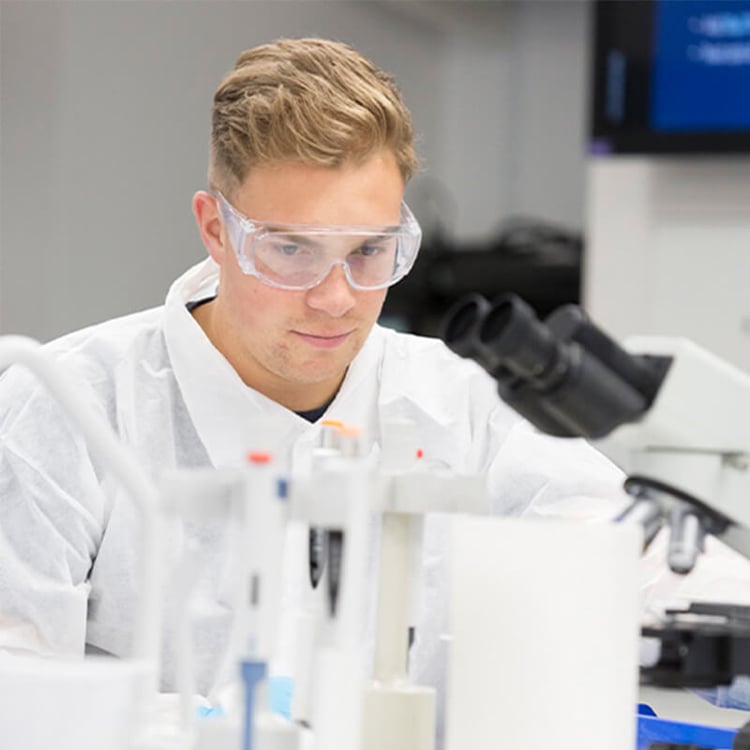
Our graduates go on to work in different specialisms within the biomedical sciences, such as:
- Microbiology
- Haematology
- Immunology
- Cellular sciences
- Drug discovery
- Genetics
- Neuroscience.
Many take on roles in the NHS and biopharmaceutical industry. Others choose to work with local communities to improve access to healthcare.
With our BSc Biomedical Science degree, you can also continue on to postgraduate study – researching cancer and neurodegenerative disease or taking courses that prepare you for patient-facing healthcare professions.
Open days
Get a real taste of our campus, community and what it’s like to study at Roehampton
Applying
Full-time UK undergraduate students apply through UCAS.
Entry tariff
112–128 UCAS points (or equivalent)
Looking to work out your UCAS points or find out about our entry requirements? Find out more.
When we consider applications to study with us, we form a complete view of your achievements to date, and future potential, and can offer flexibility in entry requirements. Find out more about our Contextual Offer scheme.
Specific entry requirements
A level/BTEC (or equivalent qualification) required in Biology or Chemistry.
GCSE (or equivalent) requirement: Maths, Grade C/4.
General entry requirements
September 2025 entry tuition fees
UK (home) tuition fees
Undergraduate degree: £9,535
Foundation Year: £9,535
We offer a wide range of scholarships and bursaries. See our financial support pages for UK students.
We also provide other ways to support the cost of living, including free buses and on-campus car parking, hardship support and some of the most affordable student accommodation and catering in London. Find out more about how we can support you.
International undergraduate students apply through our direct application system.
Entry tariff
112–128 UCAS points (or equivalent)
Looking to work out your UCAS points or find out about our entry requirements? Find out more.
When we consider applications to study with us, we form a complete view of your achievements to date, and future potential, and can offer flexibility in entry requirements. Find out more about our Contextual Offer scheme.
Specific entry requirements
A level/BTEC (or equivalent qualification) required in Biology or Chemistry.
GCSE (or equivalent) requirement: Maths, Grade C/4.
General entry requirements
September 2025 entry tuition fees
EU and international tuition fees
Undergraduate degree: £16,950
Foundation Year: £16,950
International Foundation Pathway: £16,950
We offer a wide range of scholarships and bursaries. See our financial support pages for international students.
We also provide other ways to support the cost of living, including free buses and on-campus car parking, hardship support and some of the most affordable student accommodation and catering in London. Find out more about how we can support you.


